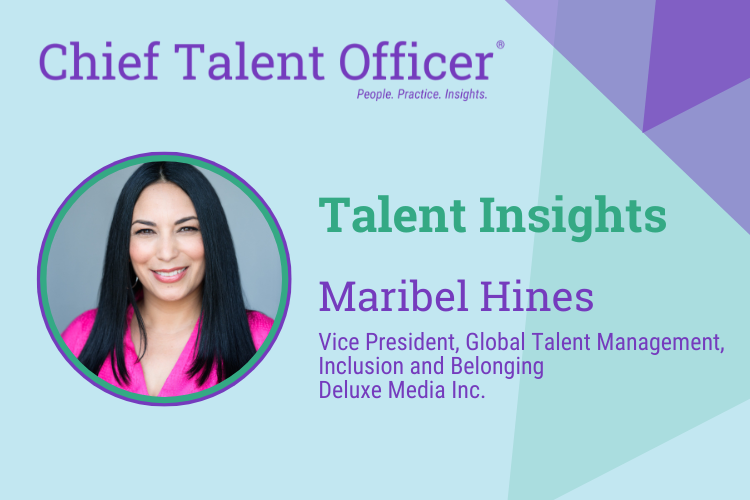Chief Talent Officer’s “Talent Insights” series is dedicated to sharing the insights and expertise of influential talent executives. In this Q&A series, we garner strategic insights, innovative approaches and challenges overcome from C-suite talent and HR executives, chief talent officers, chief people officers and more who are shaping the future of talent management.
What initially drew you to a career in talent management, and how have your experiences in the field evolved over the years?
I fell in love with the world of HR while in college, when I took an Organizational Behavior class as a junior. I was intrigued to learn there are people in organizations who can build a career from helping other professionals learn, develop and thrive. That drew me into the world of talent development, which blossomed into the broader world of talent management, inclusion and culture. Early in my career, I realized this was my path and I was excited to explore it, then nurture my experiences in all things people development. Over the course of my 20+ year career, I have stayed true to my passion of being in a “development-oriented” role, and I have done this by challenging myself to lead LOD functions across a range of industries and global organizations.
Fast-forward to today, and my career experiences encompass a range of industries (e.g. health and wellness, CPG, entertainment, retail, and bio tech), public, private and non-profit. My experience at these organizations has been at different stages of growth, organizational maturity and priorities. I have successfully led teams through periods of growth, change and transformation. Throughout my career, I have championed programs that nurture talent from within the organization, fostering a pipeline of ready-now and future leaders.
What core values and principles do you believe are essential for building a positive and inclusive company culture?
I believe that people are the heart of any organization, and investing in their growth is key to achieving sustainable success. Throughout my career, I have prioritized creating pathways for talent to flourish, whether through coaching and mentorship programs, leadership experiences, practical tools and resources, or personalized development support. I’ve seen firsthand the positive impact of these initiatives—increased employee engagement, improved retention rates, and a stronger leadership bench capable of driving organizational growth. I believe the following core leadership values are essential for building a positive and inclusive culture:
1) Respect: We show respect through active listening. We act with respect. We model respect, and we assume positive intentions especially when something we hear or see does not land well. We further cultivate respect by being curious and asking questions, coming from a place of genuine curiosity. We treat others with dignity and respect, regardless of their background and viewpoints.
2) Transparency: We foster a positive, inclusive culture through open communication, trust and accountability. When we as leaders promote cross-departmental teamwork and transparency, we create a sense of community and shared purpose, leading to greater trust in leadership and alignment with the organization’s values.
3) Empathy: Encouraging understanding and compassion in interactions helps create a workplace where individuals feel respected, supported and understood, leading to stronger interpersonal connections. By prioritizing mental and emotional well-being, we foster an environment where employees are more resilient, feel safe to express their needs, and are empowered to seek help, ultimately enhancing both personal and team success.
4) Trust: Trust is the foundation for 1-to-1 interpersonal relationships, as it enables individuals to feel confident in their colleagues’ intentions and support. Trust, in turn, creates a safe space for open communication and risk-taking (often referred to as psychological safety). When psychological safety is present, people are more likely to trust one another, knowing they can express themselves without fear of judgment or reprisal, reinforcing a cycle of mutual respect and collaboration.
Altogether respect, transparency, empathy, and trust are interrelated because they create a foundation of open communication and mutual understanding, where individuals feel valued and supported. When respect and empathy are present, transparency fosters trust, and trust reinforces the positive behaviors necessary to sustain an inclusive culture.
I believe in leading with a combination of strategic vision and hands-on execution. My leadership style is grounded in fostering a culture of trust, collaboration, accountability, continuous improvement and future focus. It’s important to set a clear vision, engage people to contribute toward the vision and empower teams to plan how we’ll execute together. I strive to foster an environment where people feel heard, respected and valued.
Can you share a significant challenge you’ve faced as a talent leader and how you successfully navigated through it?
My current organization has been experiencing significant change since early 2023. The enterprise has navigated multiple rounds of workforce reductions, and re-strategized organizational design plans. You can imagine the amount of personal and team anxiety this has brought forth. As a talent leader, I have collaborated with my HR business partner colleagues alongside the executive business unit leaders, to plan change management and change leadership initiatives so our people leaders are properly supported to navigate the human side of change efforts. It has been a challenging road but resilience and adaptability have been key to collective success, and the organization is on a positive trajectory.
What strategies have you found most effective in attracting and retaining top talent in competitive industries?
1) Attracting: Clarity in (building and) communicating the employee value proposition (EVP) to prospective candidates while involving current employees in shaping and refining how we portray the organization externally.
2) Retaining: Getting creative with the means to provide differentiated development investment, support and compensation to top talent. Balancing intrinsic and extrinsic motivational drivers.
How do you balance advocating for employees’ needs while aligning with your company’s business objectives?
There is no one approach that will work for all situations. Generally, transparency and open communication are fundamental to how I operate. It’s important for leaders to recognize when to be advocates for the organization and when to be advocates for their team/employees. It’s a fine balance, and we need to continually assess what and how we are doing in this space. I consider ways to drive alignment while driving accountability. I also recognize that people learn, communicate and interact differently, and I tailor my communication and influence approach based on what I know of the person, situation and goal at hand. I do my best to consider stakeholder needs and the broader context at play. I remind myself to be appropriately candid yet tactful so that I model transparency and open communication.
What leadership skills do you prioritize and cultivate as a senior talent leader to inspire your team and drive talent initiatives?
1) Visionary thinking: Articulating a clear vision for talent development that aligns with organizational goals and addresses a range of stakeholder needs. If I clearly articulate the vision it’s easier to help teams understand the larger purpose behind their work.
2) Collaboration: I promote (and identify) opportunities for cross-functional teams to work together. (It’s important to also recognize that diversity goes beyond race/gender. It’s also about diversity of thought, educational and working background, cultural experiences, etc.)
3) Adaptability: The talent landscape has been evolving and I’m intentional about modeling different ways to be flexible to pivot strategies based on new trends, technologies or organizational needs.
4) Coaching and mentoring: Investing in the growth of team members through coaching, mentorship, sponsorship and guidance helps develop their skills and builds a strong talent pipeline. 1-on-1s are opportunities to identify what each team member needs and how I can support them.
5) Cultural competence: I understand the immense value of diversity (of all forms) and embrace opportunities to build my cultural competence and agility muscles. My team is encouraged to enrich their understanding and deepen their awareness for the multi-faceted dimensions of diversity.
What game-changing advice would you offer if you could go back in time and mentor your younger self?
1) Don’t say no (yet): Before dismissing an opportunity, take the time to explore the “what-if.” Engage in meaningful conversations, ask thoughtful questions and imagine yourself embracing what’s being offered. Create space for your thoughts to evolve, and then make a decision—you’ll give yourself the chance to uncover possibilities you may have overlooked in the moment.
2) Take calculated risks: Yes, it is easier said than done. But the message here is to find ways to tell yourself: “Don’t be afraid to step outside your comfort zone.” Ask yourself, “What’s the worst that could happen? And, can I live with that? What could I learn? How could this broaden my perspective?” Taking risks can help you overcome fear and embrace new experiences that can expand your skills, broaden your perspective and unlock new opportunities for personal and professional growth.
What do you feel is currently the single biggest challenge facing talent professionals and the industry as a whole?
Leveraging AI and technology integration. The rise of new technologies, such as AI and automation, has made it difficult to ignore — talent professionals must continuously update their skills and knowledge, and find ways to integrate these technologies into training and development programs. It’s a complex challenge, but one that talent leaders and organizations cannot ignore much longer. Additionally, as industries evolve, there’s a growing demand for new skills that may not have been prioritized in traditional training programs. How organizations identify and address these skill gaps could make them competitive differentiators.
We’re always looking to showcase innovative tools and technologies. Can you share one tech product or platform that has significantly improved your work processes and why you find it valuable?
I have been fascinated by the evolving nature of AI in the leadership landscape, and specifically how it can help people leaders. Our team is exploring BetterUp and CoachHub as a way to offer democratized coaching for managers across our global enterprise. In addition to 1-on-1 live coaching, both platforms offer embedded AI coaching and support for managers. Managers can chat with AI for help on overcoming a challenge and to gain perspective on a particular issue. I’m excited for what’s ahead and how AI can provide amazing value to leaders and organizations.
Interested in being featured in our “Talent Insights” series? Please complete this FORM.















